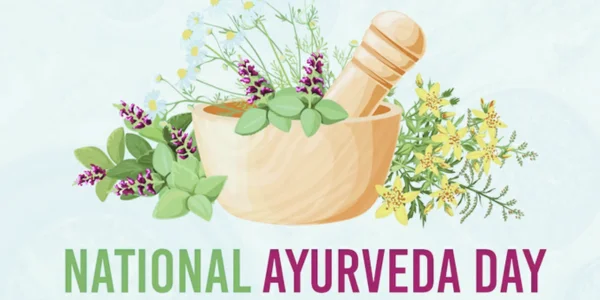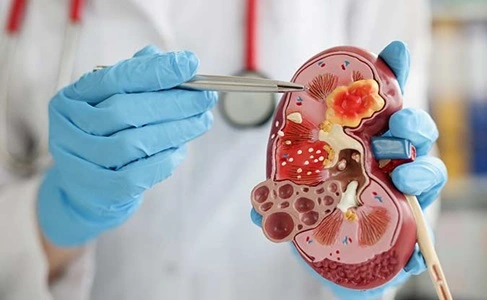Ayurveda, a traditional system of medicine rooted in ancient Indian wisdom, holds a special place in the hearts of millions across the country and beyond. To honor this time-tested holistic healing system, National Ayurveda Day is celebrated annually in India. It aims to spread awareness about Ayurveda, its benefits, and its potential to transform modern healthcare practices. Observed on Dhanvantari Jayanti, which falls during the festival of Dhanteras, National Ayurveda Day underscores the importance of integrating traditional knowledge with contemporary living.
Let’s explore the history, significance, and celebrations of National Ayurveda Day, as well as the relevance of Ayurveda in today’s world.
What is Ayurveda?

Ayurveda, often referred to as the “Science of Life,” is one of the oldest healing systems in the world. It originated in India over 5,000 years ago and is deeply intertwined with the Vedic traditions. The word “Ayurveda” is derived from Sanskrit, where “Ayur” means life and “Veda” means knowledge.
Ayurveda emphasizes a holistic approach to health, focusing on the balance between the body, mind, and spirit. It seeks to identify the root cause of ailments rather than merely treating symptoms.
Key Principles of Ayurveda
1. Tridosha Theory:
- The human body is governed by three doshas:
- Vata (Air and Ether): Movement and communication.
- Pitta (Fire and Water): Metabolism and transformation.
- Kapha (Water and Earth): Structure and stability.
- Maintaining a balance among these doshas is essential for good health.
2. Five Elements: Ayurveda believes in the presence of five elements—air, water, fire, earth, and space—that make up the universe and human beings.
3. Prevention Over Cure: Ayurveda emphasizes preventative care through proper diet, yoga, meditation, and herbal remedies.
History of National Ayurveda Day
National Ayurveda Day was first celebrated in 2016, initiated by the Ministry of AYUSH (Ayurveda, Yoga & Naturopathy, Unani, Siddha, and Homeopathy). The day is observed on Dhanvantari Jayanti, which falls on the occasion of Dhanteras, two days before Diwali.
Lord Dhanvantari, regarded as the God of Ayurveda, is believed to have emerged from the churning of the ocean (Samudra Manthan) holding a pot of Amrit (nectar of immortality). He is considered the divine healer and the pioneer of Ayurveda.
Objectives of National Ayurveda Day:
- To promote awareness about Ayurveda as a preventive and curative healthcare system.
- To encourage citizens to incorporate Ayurvedic practices into their daily lives.
- To celebrate Ayurveda’s contribution to global healthcare and its growing relevance in modern medicine.
Significance of National Ayurveda Day
1. Reviving Ancient Wisdom
Ayurveda is not just a system of medicine but a lifestyle. National Ayurveda Day aims to reconnect modern society with the timeless principles of Ayurveda, which offer natural and sustainable solutions for physical, mental, and emotional well-being.
2. Promoting Holistic Healthcare
In a world dominated by allopathy and quick-fix treatments, Ayurveda serves as a reminder of the importance of addressing the root cause of illnesses and maintaining overall harmony within the body.
3. Boosting Global Recognition
India is the birthplace of Ayurveda, and National Ayurveda Day provides an opportunity to showcase its rich heritage on a global platform. The growing interest in Ayurvedic therapies and products worldwide highlights its universal appeal.
4. Encouraging Research and Development
National Ayurveda Day motivates institutions and researchers to explore the scientific basis of Ayurvedic principles, ensuring that the system evolves with modern advancements.
How is National Ayurveda Day Celebrated?
The celebrations for National Ayurveda Day are spearheaded by the Ministry of AYUSH in collaboration with state governments, universities, healthcare institutions, and Ayurvedic practitioners.
1. Awareness Campaigns
- Seminars, workshops, and webinars are conducted to educate people about the benefits of Ayurveda.
- Social media campaigns share information about Ayurvedic remedies, practices, and principles.
2. Special Events in Ayurveda Colleges
- Ayurvedic colleges and institutions organize events like free health check-ups, herbal fairs, and demonstrations of Ayurvedic therapies.
- Competitions and quizzes are held for students to deepen their understanding of Ayurveda.
3. Dhanvantari Puja
- On Dhanvantari Jayanti, special prayers and rituals are performed to seek blessings from Lord Dhanvantari for good health and prosperity.
4. Launch of Initiatives
- The government often launches new programs and schemes to promote Ayurvedic education, research, and healthcare.
- Recent years have seen initiatives to integrate Ayurveda with public health systems.
5. Discounts on Ayurvedic Products
- Many Ayurvedic brands offer discounts on herbal medicines, wellness products, and organic supplements to encourage their use.
Ayurveda in Modern India
With increasing health consciousness, Ayurveda has seen a resurgence in recent years. From herbal teas and organic skincare products to Panchakarma therapies and dietary plans, Ayurveda has seamlessly blended into contemporary lifestyles.
1. Ayurveda and COVID-19
The COVID-19 pandemic underscored the importance of immunity-boosting practices, many of which are rooted in Ayurveda. Herbal formulations like Ashwagandha, Giloy, and Tulsi gained popularity for their role in boosting immunity and managing stress.
2. Integration with Modern Medicine
The Indian government is working to integrate Ayurveda with modern healthcare systems. For instance:
- Ayushman Bharat includes provisions for Ayurvedic treatments.
- Research is being conducted to validate Ayurvedic remedies using scientific methods.
3. Global Market for Ayurveda
India is one of the largest exporters of Ayurvedic products. The global wellness industry has embraced Ayurvedic principles, leading to a surge in demand for herbal medicines, oils, and therapies.
The Role of the Ministry of AYUSH
The Ministry of AYUSH has played a pivotal role in popularizing Ayurveda in India and abroad. Key initiatives include:
- Establishing AYUSH Health and Wellness Centers across India.
- Promoting Ayurveda tourism by collaborating with wellness resorts and spas.
- Encouraging the use of Ayurvedic medicines alongside allopathy in rural and urban healthcare settings.
Challenges Faced by Ayurveda
While Ayurveda has gained popularity, it faces several challenges:
1. Scientific Validation:
Many Ayurvedic formulations lack sufficient clinical trials, which limits their acceptance in global healthcare systems.
2. Misuse of the Label:
The term “Ayurvedic” is often misused for commercial gain, leading to the sale of substandard products.
3. Lack of Awareness:
Despite its rich heritage, many people are unaware of Ayurveda’s potential and principles.
4. Integration Issues:
The integration of Ayurveda with modern healthcare practices requires more streamlined efforts.
Interesting Facts About Ayurveda
1. World’s Oldest Healing System: Ayurveda is considered one of the first systems of medicine ever documented, with its roots in the Atharva Veda.
2. Personalized Medicine: Ayurvedic treatments are highly individualized, based on a person’s unique constitution or Prakriti.
3. Global Recognition: The World Health Organization (WHO) has recognized Ayurveda as a traditional medicine system, further boosting its credibility.
Conclusion
National Ayurveda Day is a celebration of India’s ancient wisdom and its continued relevance in modern times. It serves as a reminder of the importance of holistic health and the need to preserve and promote our rich Ayurvedic heritage.
On this day, let us embrace the timeless principles of Ayurveda and take steps toward a healthier, balanced life. As we look to the future, integrating Ayurveda with modern science and technology can pave the way for a sustainable and holistic healthcare system that benefits all.

